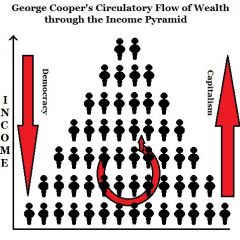Jeremy Corbyn resoundingly won the vote of party members, holding onto parliamentary leadership of the Labour Party.
Most Labour MPs are unhappy with the decision, believing that it will be electoral poison. Some are looking for support via the unions to change the way the parliamentary leader is elected. For them, Corbyn’s re-election was a disaster; for those who like Corbyn’s socialism it was a great victory.
How can a party so fundamentally divided really work. On the one side, British Labour is dominated by members who hate profit and want to socialize everything, led by Jeremy Corbyn. On the other side, most British Labour MPs recognize that we live in a capitalist economy, with this concept being accepted by the majority of voters.
It is time for a new party in the UK that overtly recognizes the role of capitalism in generating new wealth, and also recognizes that only democratic forces will result in this new wealth being more equitably distributed. This is the true central position, and the argument for an “equitable distribution” a basis for a full-throated contest with the Conservatives.
Democratic Capitalism, not socialism, is the way forward for the UK. It is not the “Free Trade Capitalism” of the Conservatives.
Democratic Capitalism
The economic model of Democratic Capitalism recognizes that capitalism is the engine for economic development. It will deliver economic benefits that neither socialism (of the Sanders and Corbyn type) nor communism (of the Venezuelan and Cuban type) is able to deliver. Yet the 21st century has shown that capitalism needs controls, exercised via democratic processes, to ensure that it serves everyone, not just those in control of capital.
It is time that we clearly recognized the two most important economic drivers in a modern economy, Democracy and Capitalism, and stopped toying with dysfunctional alternative models, like that one presented by Jeremy Corbyn and supported by a majority of Labour members. It is quite unlikely that Corbyn’s model will be supported by a majority of UK voters, unless Theresa May badly drops the ball (which seems unlikely).
